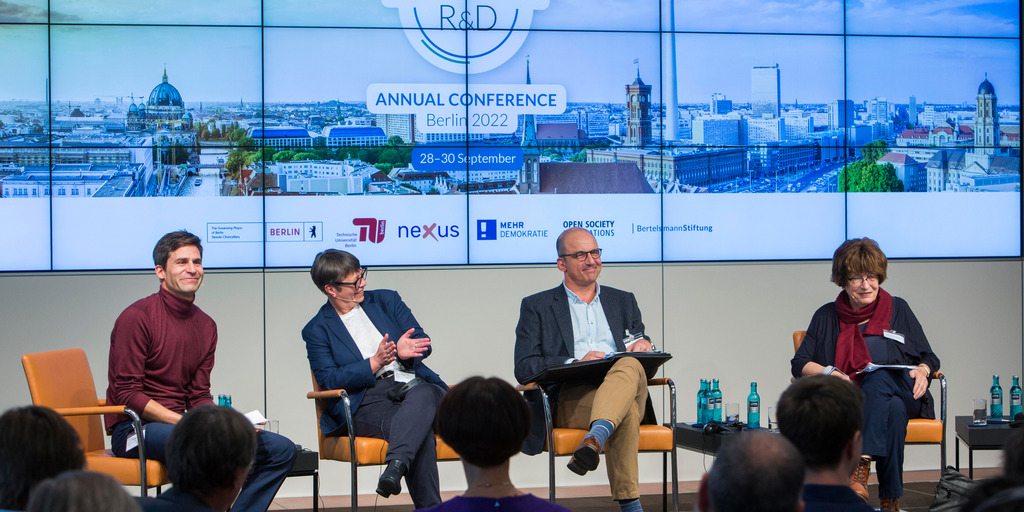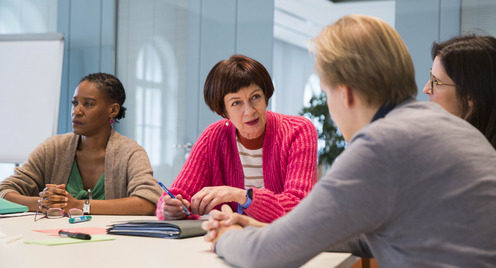The fifth edition of the Democracy R&D Annual Conference brought together 125 academics, practitioners and policy-makers from all continents. Network members came from the USA, Brazil, Mexico, Kenia, Nigeria, Mauritius, Israel, India, Taiwan, Australia and 13 European countries including Ukraine. Under the title "Innovating Deliberative Democracy", the conference explored three key themes: political buy-in, inclusive participation, and democracy in (times of) crisis. Together with two other German DR&D member organisations, nexus institute and Mehr Demokratie e. V., the Bertelsmann Stiftung played a leading role in organising and hosting the event. The Technische Universität Berlin, the Senate Chancellery of Berlin and the Open Society Foundations were event partners as well.

© Sebastian Pfütze
Citizen participation is the talk of the town
Citizen participation in Chile on pensions and health, a citizens' assembly in Montenegro on corruption and a global assembly on climate - citizen participation is booming. Between 28 and 30 September 2022, 125 leading democracy experts from around the world met at the Democracy R&D Annual Conference in Berlin. The event showed that the field of participatory democracy is not only growing, it is very much evolving.
Content
The conference in pictures
The conference programme was a product of co-creation. More than half of the participants was involved in organising sessions. Some sessions explored the state of (deliberative) democracy in specific countries, with sessions addressing Ukraine's experience of wartime democracy, Taiwan's track record of digital deliberative action. Other sessions dealt with concrete projects, such as the Conference on the Future of Europe, or Israel's first-ever citizens' assembly. Furthermore, sessions focused on co-creating new methods (e.g. enclave deliberation) and new strategies (e.g. vis-a-vis climate assemblies and multilingual assemblies).
Five years ago, we were still seen as exotics in the political world. In the meantime, we have experienced a wave of citizen participation that is spreading worldwide. This inspires us to keep going.
Anna Renkamp, Democracy expert of Bertelsmann Stiftung
Bridging the gap between ideals and political reality, two of the sessions were specifically aimed at bringing politicians into the conversation. On 28 September, a high-level dialogue on the future of participatory democracy with Gisela Erler (Former State Counsellor for Civil Society and Citizen Participation at the State Ministry of Baden-Württemberg), Gesine Märtens (State Secretary for Democracy, Europe and Equality, Saxony) and Colin Scicluna (Head of Cabinet to EU Vice President Dubravka Šuica, European Commission) took place. On the second day of the conference, half of the participants had a meeting in the Bundestag with three Members of Parliament: Helge Lindh (SPD), Leon Eckert (Alliance 90/The Greens) and Ralph Edelhäußer (CSU).
Political buy-In: how to better embed citizen deliberation in regular political processes
Essential for political buy-in is the build-up of trust, both on the side of citizens and on the side of politicians. Politicians must become willing to accept that citizens' assemblies might generate results they disagree with. Leon Eckert assured: "I believe that the wisdom of the many may strengthen local authorities. This potential should be used for our political processes at national level."
Ralph Edelhäuser from the CSU added that, as participation in parties and elections is declining, innovative processes like deliberation are required to engage broader parts of society in public decision-making. Thereby, deliberation and representation are not in competition, but deliberation can strengthen representative democracy. Colin Scicluna pointed out: "It is not just about listening to the citizens, but also very much about implementing what has been proposed."
Now, it is time to move from experimentation to integrating innovative citizen participation in regular democratic structures. The federal state of Saxony has provided funding to help municipalities with finances and know-how to initiate citizen participation and integrate it into regular processes. The German parliament is currently designing the implementation of citizens' councils. This includes the selection of suitable topics, the venues for the citizens' councils and follow-up processes for dealing with the citizens' recommendations.
In Brazil, more and more public administrations on the local level want to implement citizen assemblies – so many that we can barely keep up with supporting them! It is amazing to see that governments begin to see deliberative participation as a resource, rather than a burden, and we hope and work so they have the means to make it happen.
Silvia Cervellini, Facilitator of citizens' assemblies at Delibera Brazil
Inclusive participation: how deliberative processes can represent the diversity of society
Throughout the conference, network members and politicians alike stressed that deliberation must be carefully designed to increase the inclusivity of the political system. Helge Lindh asserted: "Citizens' assemblies should not just be an instrument for the powerful, but especially for those who are usually less involved, who usually do not participate in decision-making processes."
To reach this goal, the German parliament will organise citizens' assemblies that do not only include German citizens, but everyone who has been living in Germany for more than three months, and not only adults but also young people above age 16.
Democracy in (times of) crisis
Democracy is facing various crises. Polarisation, fragmentation, inequality, lacking trust between politicians and citizens - these facets of the democratic crisis were pointed out by the three politicians at the high-level event. Gisela Erler, Gesine Märtens and Colin Scicluna agreed that deliberative tools can help to reduce societal cleavages. Regarding the EU level, Colin Scicluna remarked: "In Europe, we are trying to jump to the front of the deliberative wave, embedding citizens' assemblies in European policy design."
Throughout the three days of the Democracy R&D Annual conference it became clear: in the face of manifold crises, we need to create a modern democracy equipped to meet the expectations of citizens and the challenges of our times. According to Colin Scicluna, such democratic renewal requires vision - and visionary political leadership is lacking. In this context, the role of civil society is even more important than usual, providing much-needed visionary proposals and keeping politicians on their toes.
"Seeing is believing": experiencing collective action is key for democratic change
We continuously need to work on developing democracy further. For that, collective learning and openness for constructive dialogue between politicians and citizens is needed. Experiencing new forms of collective action and dialogue are key for democratic change.
Democracies are built through co-creation and collective action, reaching beyond silos or national borders, and with an openness to listen and learn from each other. By stimulating this type of transnational learning and community-building, the 2022 edition of the Democracy R&D Annual Conference played an important role in strengthening democratic connections and imagining new democratic futures.
Background: Democracy R&D Network
Democracy R&D is an international network of organisations, associations, and individuals helping decision makers take hard decisions and build public trust. Members of the network collaboratively develop, implement, and promote ways to improve democracy, from the local to the global level.
Democracy R&D envisions democracies that incorporate everyday people in major public decisions which our present structures struggle to address – through processes that are representative, deliberative, free from manipulation, informed, and influential.
Each year members of the Democracy R&D network come together to exchange ideas, disseminate knowledge, meet new people, and renew existing relationships at the Democracy R&D Annual Conference. Previous editions have taken place in Madrid (2018), Paris (2019), Manchester (2020) and online (2021).




